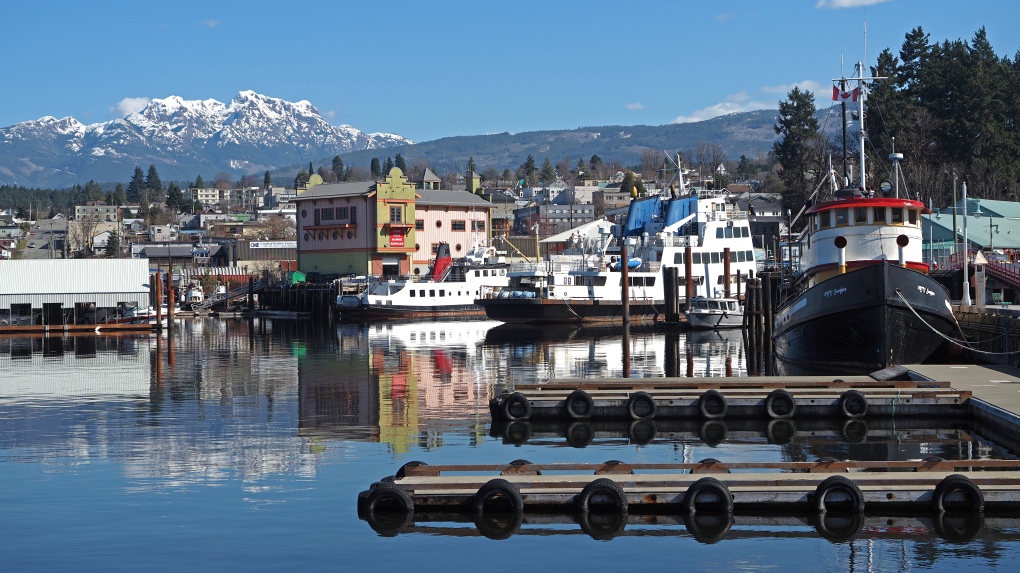Daily heat records tumble again in B.C., as drought conditions worsen
 The waterfront area of Port Alberni, B.C., is seen in a stock image taken in March 2020. (Shutterstock)
The waterfront area of Port Alberni, B.C., is seen in a stock image taken in March 2020. (Shutterstock)
Unseasonable warmth over much of British Columbia is showing no sign of easing, with another day of temperature records in the books and many regions reporting no significant rain since early July.
Environment Canada says 11 daily maximum temperature records were set Wednesday across parts of Vancouver Island, the central coast, southern Interior and southeastern B.C.
At 26.9 C, the Pemberton area broke a record that has stood since 1908.
Port Alberni and Vernon, with nearly identical temperatures just above 25 C, surpassed records that have stood for 122 years.
Normal temperatures for early October usually range from 14 C to 16 C in those cities.
The Ministry of Forests has ranked Vancouver Island, the inner south coast and northeastern B.C. at the second-most severe level of drought on a five-point rating scale.
The Sunshine Coast Regional District has also opened an emergency operations centre as it confronts severe drought in a key water system.
The district is using a siphon system to pull additional water from Chapman Lake to feed the critically low Chapman water system, which supplies drinking water to roughly 90 per cent of Sunshine Coast residents.
“The last day of significant rainfall on the Sunshine Coast was over 80 days ago on July 6, and Environment Canada has informed us not to expect any significant rainfall for at least the next two weeks,” the district's chief administration officer Dean McKinley said in a statement posted last week.
The district was expected to install new siphons this week at Edwards Lake, the district's secondary reservoir, McKinley said.
The Sunshine Coast Regional District has imposed its most stringent water restrictions and is backing those with increased enforcement and $500 fines for anyone using drinking water for outdoor use.
This report by The Canadian Press was first published Oct. 6, 2022.
CTVNews.ca Top Stories

Teenage phenom Gavin McKenna scores, Canada tops Finland 4-0 in world junior opener
Teenage sensation Gavin McKenna scored late in the first period and Carter George made 31 saves for the shutout as Canada picked up a 4-0 victory over Finland in the host country's opener at the world junior hockey championship Thursday.
Ministers Joly, LeBlanc travel to Florida to meet with Trump's team
Two members of Prime Minister Justin Trudeau's cabinet will be in Palm Beach, Fla., Friday to meet with members of Donald Trump's team.
Hwy. 401 off-ramp shut down due to Boxing Day deal-hunters now reopen
A Highway 401 off-ramp west of Toronto that became so clogged up with Boxing Day deal-hunters Thursday that police had to shut it down out of safety concerns has re-opened.
India alleges widespread trafficking of international students through Canada to U.S.
Indian law enforcement agencies say they are investigating alleged links between dozens of colleges in Canada and two 'entities' in Mumbai accused of illegally ferrying students across the Canada-United States border.
Teen actor Hudson Meek, who appeared in 'Baby Driver,' dies after falling from moving vehicle
Hudson Meek, the 16-year-old actor who appeared in 'Baby Driver,' died last week after falling from a moving vehicle in Vestavia Hills, Alabama, according to CNN affiliate WVTM.
B.C woman awarded nearly $750K in court case against contractor
A B.C. woman has been awarded nearly $750,000 in damages in a dispute with a contractor who strung her along for a year and a half and failed to complete a renovation, according to a recent court decision.
Florida pizza deliverer charged with stabbing pregnant woman after tip dispute
A pizza deliverer in central Florida has been charged with pushing her way into a motel room with an accomplice and stabbing a pregnant woman after a dispute over a tip, authorities said.
2 minors, 2 adults critically injured in south Calgary crash; incident was preceded by a robbery
Multiple people were rushed to hospital, including two minors, in the aftermath of a serious vehicle collision on Thursday morning.
Christmas Eve stowaway caught on Delta airplane at Seattle airport
A stowaway was caught trying to nab a ride on a Delta Air Lines plane at Seattle-Tacoma International Airport on Christmas Eve.
































